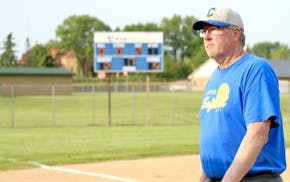When Ford Motor Co. eventually sells its shuttered St. Paul assembly plant to a redeveloper, it's a good bet that plans for its 122 acres will include a heavy emphasis on bicycle transit.
One signal of a shift from autos to bikes is right across the street from the former truck plant on Ford Parkway: The longtime union hall for the automaker's assembly-line workers is being converted into a bike shop.
The Twin Cities-based Erik's Bike Shop chain last month purchased the former Ray Busch United Auto Workers Union Local 879 hall at 2191 Ford Parkway for $447,000 in cash, Ramsey County records indicate. Owner Erik Saltvold confirmed that he is preparing to turn the 8,000-square-foot former UAW hall into his company's 20th location, and its first in St. Paul.
The Highland Park neighborhood — thanks to its proximity to the Mississippi River trail system and the Ford Bridge connecting St. Paul with Minneapolis — already is a popular one with bicyclists, and most of the redevelopment scenarios being discussed for the plant site involve bike- and pedestrian-friendly mixes of residences and businesses.
Those factors made the call to buy and convert the 60-year-old union hall into a bike shop an easy one, Saltvold said.
"We've been trying to find a location in St. Paul for a number of years, and this building was just the right size," he said. "We've wanted to be in Highland Park for a long time. It's a great retail market with great demographics, and its near the Mississippi River, which is one of the best bikeways in the country."
Fittingly, Saltvold said he first became interested in the building when he spotted its "For Sale" sign as he was doing his regular river trail bike ride.
"I took a detour through Highland Park, just looking to see if anything popped up," he said. "I saw the sign, checked it out, and a week later we had an offer on the building."
David Olson, president of Erik's Bike Shop, said the company is planning on retaining and accentuating the union hall's intriguing 1950s futuristic-style facade, which lends it an element of "retro chic."
New windows will be added to display Erik's bike wares from the street while an extensive remodeling will be going on inside — basically a "gut rehab" to convert the assembly hall into a retail space.
"It's got very tall ceilings, so we can 'go vertical' with our bike storage and displays," Olson said. "It's not the first adaptive reuse we've done. Our St. Cloud store was originally an auto dealership and right now we're currently repurposing an older building in Milwaukee, which will be our 19th location."
The neighborhood is ripe for an Erik's outlet, he said, not just because of the Ford plant redevelopment plans but also because it's close to the St. Thomas and St. Catherine's university campuses, and boasts many families with young children as well as committed bike commuters.
The conversion won't be cheap, and although Olson didn't provide a dollar figure for the job, it involves costly asbestos abatement en route to an expected fall completion.
Olson said he and Saltvold are keen on preserving the exterior look of the building to pay homage to the area's legacy as a mid-20th Century industrial behemoth. But at the same time, they want to mark Highland Park's emerging status as a 21st Century biking hot spot.
"The fact that the Ford plant is transitioning from what was a truck plant in recent years into what it's going to be, and now this building across the street turning into a bike shop, is pretty significant," he said.
The growing company, which expects around $40 million in sales this year, has about 300 employees. Olson predicted requests for transfers to the new St. Paul site will be strong.
"We have a lot of staff members who live near here," he said with a laugh.
Don Jacobson is a St. Paul freelance writer.
Man agrees to 6-year sentence for fatally shooting Hopkins man on edge of downtown Minneapolis

Softball coach, with record delayed but not denied, keeps winning
Ludacris and T-Pain to stand up together at Minnesota State Fair grandstand in 2024
13-year sentence for man who fatally hit other driver while fleeing police in Oakdale

